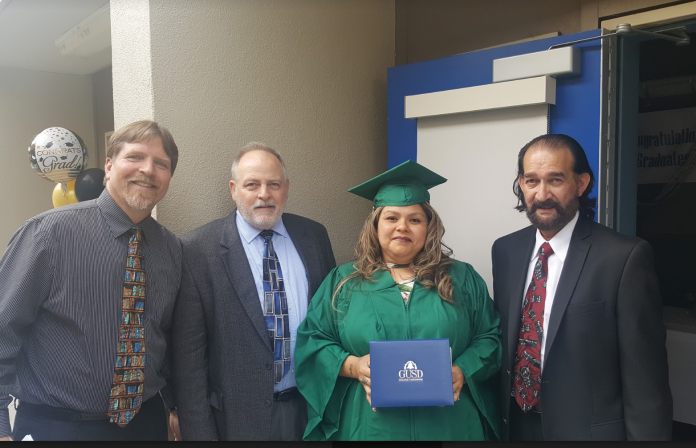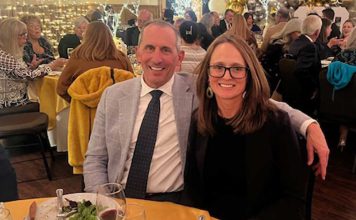
Nine hundred twenty-seven students just earned high school diplomas in Gilroy and 23 of those were handed out in the city’s first Adult Education graduation since 2013. Dropout Jovita Caspary, 37, a single mother at age 14, turned her life around and received a diploma during the program’s May 30 ceremony at the Gilroy High School Theatre.
The wife and mother of two fought back from a life of drugs and family tragedy to return to high school as an adult.
So outstanding a student was she that Caspary was one of two graduates, along with Veronica Gomez, asked to address fellow graduates.
“What a very special day for all of us,” she told her class. “In life we do things, some we wish we had never done and some we wish we could replay a million times in our heads. But they all make us who we are today.”
A $16.10 per hour supermarket deli clerk, Caspary is now focused on a career counselling youth caught up in drug use.
Rick Charvet, lead teacher in the district’s AdvancePath (cq) and Adult Education programs, told graduates, “I believe a strong community and world is built by all of us, so do me a favor and look to the person next to you and say, ‘Thank you for helping support our graduates.’ We are all part of the ‘bigger picture’ whether we want to be or not. All gestures great and small pave the way for future generations.”
In 2013, the Gilroy school district discontinued adult education when the program was restructured by state law, according to GUSD Superintendent Debbie Flores, that assigned oversight to the community college system.
As part of the restructuring, consortiums of colleges and school districts were created to work together to serve adult learner needs, she said.
The local group decided school districts have the expertise to offer diploma track coursework, basic adult education coursework and high school equivalency programs, according to Flores.
Two years ago, as finances improved, California pumped $500 million back into the program statewide and adult diploma programs returned to the GUSD, Camacho-Light said.
“We had a new ballgame,” Greg Camacho-Light said.
That got Charvet’s attention. He said, “Once I found out GUSD was bringing Adult Ed back, I told Greg I wanted to be part of it.”
So the pair, who been with the program before, reignited the effort in the fall of 2016, bringing in a talented math teacher, Jose Franchi, to join the crew that would guide the first new batch of return learners to diplomas and better futures.
“Together we made it happen,” Charvet said. “When the ‘kids’ needed us we were there. They needed hope and people who cared unconditionally.”
Flores said, “Seeing all of our new graduates and hearing them speak about what a high school diploma means at any age proves the importance and worth of this program.”
School board president Patricia Midtgaard gave GUSD credit for offering students multiple pathways to a diploma.
“For some students—and there are as many scenarios as their are students—their lives are filled with instability, chaos, survival issues, and interruptions that get in the way of attaining a high school diploma in four years. Adult education gives these students another chance to successfully complete a high school diploma that will lead to other opportunities in their lives.”
School Trustee Mark Good said, “Adult Education is very important to the GUSD community. Many of the students served in Adult Education are adult students attempting completion of their degrees, or parents of GUSD children. We all know what a positive impact parental involvement has during a child’s education. Education is key to that involvement.”
Yvette Carrell-Wilkerson who, like Caspary, had dropped out of high school as a senior and started down a dark path, lauded the renewed program and its impact on her life since she encountered Charvet while working as a $14 per hour cashier.
“Mr. Charvet came into Costco one day and said, “Why don’t you just try it? I did,” she said.
She had known Charvet and Franchi when she’d attended Mount Madonna Continuation High School before dropping out.
“Being able to see both of them (again) gave me this ‘I can do it’ attitude. They are great men; they have this positive vibe about them that just rubs off, it makes you feels like, ‘I can do it!’” said Carrell-Wilkerson, who was born in Reno and raised in Gilroy.
Prior to joining the program, she said, she had drifted into drug addiction and alcoholism and smoked two packs of cigarettes a day.
“I woke up one day and didn’t want to live that way any more, I knew there needed to be a change.”
She landed a union job and worked hard, then took Charvet up on his offer.
“I dove in with both feet,” she said, crediting Charvet, Franchi and Camacho-Light with giving the program its effective approach.
“They gave me a plan of action and I did it. The program was amazing,” she said. “It was nothing but love; I am blessed to have been a part of it for sure.”
As for the future, she wants to continue her schooling and become a teacher.
“I want to be able to give back to my community, I want to make a difference.”












